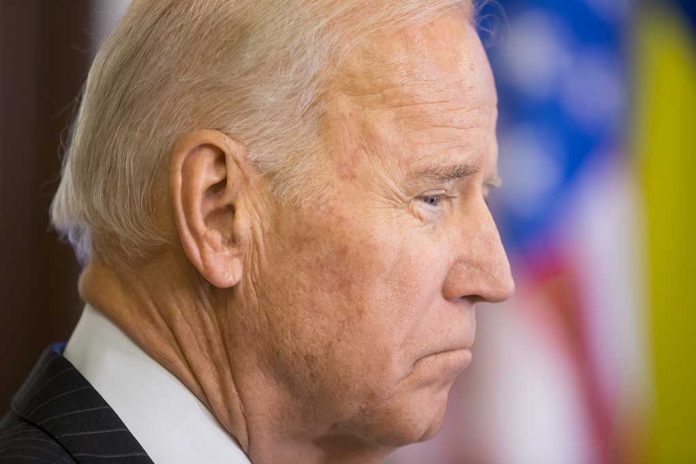
President Trump launches decisive military action against Iran-backed Houthi rebels in Yemen, reversing years of Biden-era policies that critics claim emboldened the terrorist group’s regional aggression.
Key Takeaways
- Trump ordered extensive airstrikes on Houthi positions in Yemen, targeting bases, leadership, and missile defense systems to protect American interests and global shipping routes.
- Critics argue the Biden administration’s 2021 decision to remove the Houthis from the terrorist list and end support for Saudi-led coalition operations emboldened Iran-backed aggression.
- The Houthis have disrupted international shipping in the Red Sea and Gulf of Aden since fall 2023, significantly impacting global trade.
- Trump’s military response signals renewed U.S. commitment to Saudi Arabia and regional security after what analysts describe as “four years of ambivalence” under Biden.
- Iran has rejected Trump’s warnings against supporting the Houthis, claiming the group operates independently despite evidence of Tehran’s backing.
Trump’s Military Response to Houthi Aggression
President Donald Trump has ordered substantial military strikes against Yemen’s Iran-backed Houthi militants, marking a significant shift in U.S. policy toward the group that has increasingly disrupted international shipping lanes. The operations specifically targeted Houthi bases, leadership infrastructure, and missile defense systems, with explosions reported across multiple provinces including Sanaa and Saada. The military action comes in response to escalating Houthi attacks on commercial and military vessels traversing critical global trade routes in the Red Sea and Gulf of Aden.
In announcing the operation on Truth Social, Trump issued a stern warning to the militant group: “No terrorist force will stop American commercial and naval vessels from freely sailing the Waterways of the World.” The president further emphasized the severity of the U.S. response by declaring, “TO ALL HOUTHI TERRORISTS, YOUR TIME IS UP, AND YOUR ATTACKS MUST STOP, STARTING TODAY. IF THEY DON’T, HELL WILL RAIN DOWN UPON YOU LIKE NOTHING YOU HAVE EVER SEEN BEFORE!” Military officials have indicated these strikes are part of a calculated operation designed to degrade Houthi offensive capabilities.
Biden Administration’s Yemen Policy Under Scrutiny
The Trump administration’s decisive action against the Houthis stands in stark contrast to policies implemented under former President Biden. In February 2021, Biden announced the end of U.S. offensive support for the Saudi-led coalition fighting against the Houthis and removed the group from the U.S. terrorist list. This decision, intended to facilitate humanitarian aid to Yemen, has since drawn intense criticism from regional experts and American allies who argue it fundamentally misread the threat posed by the Iranian proxy group.
“Biden’s early appeasement of the Houthis, lifting them from the terror list with nothing in return, emboldened their aggression,” said Salman Al-Ansari.
Saudi geopolitical analyst Salman Al-Ansari further noted that the current military response “strikes are long overdue,” as the Houthis have spent years disrupting global trade, attacking U.S. forces, and fueling regional instability. The Biden administration eventually re-designated the Houthis as a terrorist group, but critics argue this reversal came too late after the group had already been empowered by earlier policy decisions. Military experts suggest the current operation signals a complete reset of America’s approach to the Yemen conflict.
Ayatollah Ali Khamenei has framed the strikes as evidence that the U.S. fears the growing strength of Yemen's Houthi rebels. https://t.co/93DaZ5nhqq
— Newsweek (@Newsweek) March 17, 2025
Regional Implications and Iranian Response
Trump’s military action against the Houthis carries significant implications for U.S. relations in the Middle East, particularly with Saudi Arabia. Jonathan Schanzer of the Foundation for Defense of Democracies observed that targeting the Houthis “will signal to the Saudis that America is back as an ally” after what he characterized as “four years of ambivalence by the Biden White House.” The operation is viewed as part of a broader strategy to counter Iranian influence in the region while protecting international shipping routes that are vital to global commerce.
“That which has caused the US and its allies to panic today is the fact that the Muslim nations are standing firmly and that this resistance will prove to be effective,” said Ayatollah Ali Khamenei.
Iran’s Supreme Leader Ayatollah Ali Khamenei has criticized the U.S. military strikes, characterizing American actions as a response driven by “panic.” Tehran continues to deny direct control over Houthi operations despite substantial evidence of Iranian material support. Military analysts note that the Houthis have expanded their attacks beyond shipping, launching missiles and drones toward Israel and claiming attacks on U.S. naval assets including the USS Harry S Truman. Defense officials have emphasized that the current operations are designed to protect American interests while sending a clear message to Iran about the costs of supporting proxy forces.
Sources:
- Iran’s Supreme Leader reacts to U.S. airstrikes on Houthis in Yemen – Newsweek
- Donald Trump Launches ‘Decisive’ Military Action Against Yemen’s Houthis – Newsweek
- Trump Dramatically Escalates Military Strikes on Yemen’s Houthis
- Critics say Biden admin empowered Houthis as Trump orders strikes against terror group | Fox News














